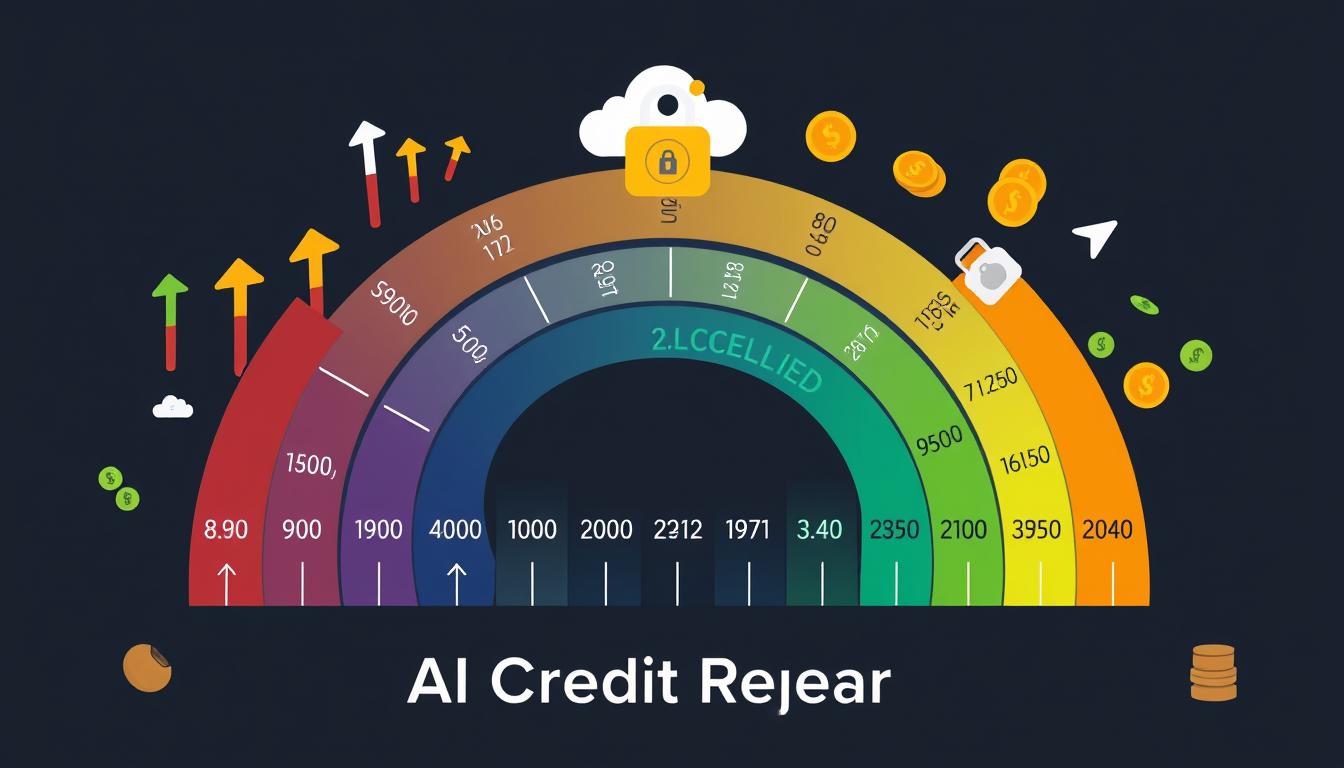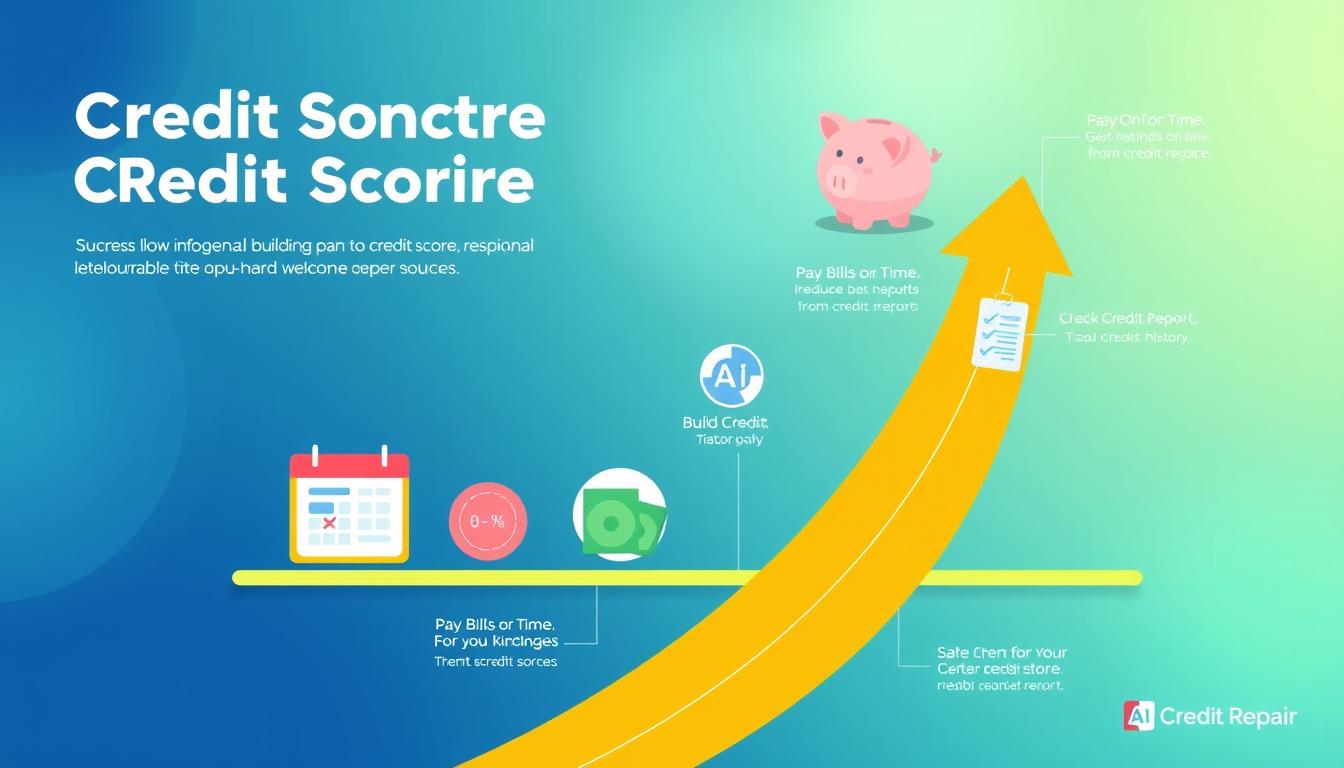A 720 credit score can unlock better interest rates and higher credit limits. It’s a key financial goal that can improve your lending opportunities.
This guide will show you how to build and maintain a 720 credit score. You’ll learn steps to take control of your financial future.
Key Takeaways
- Understand the factors that impact your credit score, including payment history, credit utilization, and credit mix.
- Establish good credit habits, such as making payments on time, keeping credit card balances low, and diversifying your credit mix.
- Monitor your credit report regularly and dispute any errors to ensure the accuracy of your credit information.
- Utilize credit repair strategies, such as negotiating with creditors and seeking professional assistance, to address negative items on your credit report.
- Seek expert advice and guidance to develop a personalized plan for achieving and maintaining a 720 credit score.
Understanding Credit Scores
Your credit score reflects your creditworthiness. It’s a three-digit number between 300 and 850. Lenders use it to assess your borrowing risk.
A higher score means lower risk. This increases your chances of loan approval. You’ll also get better terms on financial products.
Building a strong credit profile starts with understanding credit scores. Here’s what you need to know:
- Credit Score Range: The credit score range typically spans from 300 to 850, with scores above 720 generally considered excellent.
- Credit Score Importance: Your credit score impacts your ability to borrow money, the interest rates you’re offered, and even your ability to rent an apartment or get a job.
- Credit Score Factors: Your payment history, credit utilization, credit mix, and credit history length are the primary factors that determine your credit score.
Knowing credit score basics helps you take action. You can work on improving your credit score. This opens up more financial opportunities.
A higher credit score range makes you more appealing to lenders. They’ll see you as reliable and trustworthy. This underscores your credit score importance.

“Your credit score is the key to your financial future. Understand it, monitor it, and take control of it.”
Factors Impacting Your Credit Score
Your credit score is crucial for your financial health. It’s shaped by several key elements. Payment history and credit utilization ratio are two major factors.
Payment History
Payment history accounts for 35% of your credit score. It shows how well you make on-time payments. Paying bills on time is vital for a high credit score.
Missed or late payments can hurt your score. It’s important to keep up with your financial duties.
Credit Utilization Ratio
Credit utilization makes up 30% of your score. It measures how much available credit you’re using. Keeping this ratio below 30% is key for a high score.
Using too much credit can worry lenders. They might think you’re overextended. This can harm your creditworthiness.
| Factor | Impact on Credit Score |
|---|---|
| Payment History | 35% |
| Credit Utilization Ratio | 30% |
Understanding these factors can help you improve your credit score. Aim for a 720 or higher score. This can lead to better financial chances in the future.

Establishing Good Credit Habits
Building a strong credit profile requires responsible habits. Consistent credit building strategies, responsible credit usage, and effective credit management tips can improve your credit score. These habits open doors to better financial opportunities.
Timely payments are crucial for a good credit score. Payment history is the biggest factor in your credit score. Set up automatic payments or reminders to avoid missing due dates.
Keeping your credit utilization low is another vital habit. Credit utilization is the amount of available credit you’re using. Aim to keep this ratio below 30% to show responsible usage.
- Avoid maxing out your credit cards or lines of credit.
- Make sure to pay down balances regularly.
- Consider requesting credit limit increases to improve your utilization ratio.
Diversifying your credit mix can boost your score. Having various account types shows lenders you can manage different credits responsibly. This includes credit cards, loans, and mortgages.
| Credit Building Strategies | Responsible Credit Usage | Credit Management Tips |
|---|---|---|
| Make on-time payments | Keep credit utilization low | Diversify your credit mix |
| Avoid missed or late payments | Pay down balances regularly | Request credit limit increases |
| Set up automatic payments | Avoid maxing out credit cards | Monitor your credit report |
Developing these habits will help you build an excellent credit score. This score can unlock many financial opportunities for you. Stay consistent, and you’ll see improvements over time.

How to Get a 720 Credit Score
Step-by-Step Guide
A 720 credit score can unlock better financial opportunities. By following a strategic plan, you can build a strong credit profile. Let’s explore the key steps to reach this goal.
- Check Your Credit Report for Errors: Start by reviewing your credit report for inaccuracies. Dispute any discrepancies with the credit bureaus to ensure accuracy.
- Pay Down Debt: Reduce credit card balances and keep utilization below 30%. This shows responsible credit management and can boost your score.
- Increase Your Credit Limits: Ask card issuers for credit limit increases. This can improve your utilization ratio and raise your score.
- Diversify Your Credit Mix: Have different types of credit accounts. This proves you can manage various credit responsibilities well.
- Maintain a Consistent Payment History: Always pay on time. Payment history is crucial for your credit score.
These steps help you take control of your credit score. A 720 score is considered excellent credit.
This can lead to better loan rates and lower insurance premiums. You may also get more favorable credit card terms.

“Building a 720 credit score is a marathon, not a sprint. Consistency and patience are key to achieving this important financial milestone.”
Monitoring Your Credit Report
Keeping an eye on your credit report is vital for a high credit score. Regular checks help spot errors that may hurt your credit report accuracy. This proactive step can boost your creditworthiness and help you reach a 720 credit score.
Disputing Errors
If you find mistakes in your credit report, act quickly to dispute them. Contact credit bureaus and provide proof of the error. Swift action ensures your credit report monitoring efforts result in a fair credit assessment.
Taking control of your credit report can shape your financial future. It’s a smart move that can lead to long-term benefits. Investing time in credit report monitoring is a strategy that pays off.
“Regular credit report monitoring is the key to maintaining a healthy credit profile and achieving your financial goals.”
The Importance of a 720 Credit Score
A 720 credit score opens doors to amazing financial opportunities. This solid credit standing brings benefits that can boost your overall financial health. You’ll enjoy perks that can change your financial landscape.
A key perk of a 720 credit score is access to better loan rates. This means big savings over time on loans and credit cards. You’ll keep more of your hard-earned cash in your pocket.
With a 720 score, you might also qualify for higher credit limits. This gives you more financial flexibility and buying power. It’s a great tool for managing your finances.
The impact of a high credit score goes beyond loans and cards. Landlords and employers often check credit scores when making decisions. They see it as a sign of financial responsibility.
Insurance companies may offer better rates to those with high scores. A 720 credit score can lead to more housing and job options. It truly opens up a world of possibilities.
“Achieving a 720 credit score is a game-changer in the world of personal finance. It’s a testament to one’s financial discipline and responsibility, and the rewards are truly remarkable.” – Jane Doe, Financial Advisor
A 720 credit score is more than just a number. It’s a powerful tool that unlocks many financial opportunities with good credit. Understanding these benefits can motivate you to build a strong credit profile.
Take steps to improve and maintain your credit score. It will serve you well throughout your financial journey. The rewards of a 720 credit score are worth the effort.
| Benefits of a 720 Credit Score | Potential Financial Opportunities |
|---|---|
|
|
Credit Repair Strategies
Is your credit score below 720? You can use several credit repair methods to boost it. These include disputing errors, negotiating with creditors, and using secured credit cards. Credit-builder loans can also help rebuild your credit history.
Regularly review your credit report and dispute any inaccuracies. Incorrect information can significantly impact your credit score. Contact credit bureaus directly to initiate a dispute and provide supporting documents.
Negotiating with creditors is another valuable credit repair strategy. If you’re behind on payments, reach out to discuss more favorable terms. This could include reduced interest rates or new payment plans.
- Dispute credit report errors to remove inaccurate information
- Negotiate with creditors to improve payment terms and credit utilization
- Use secured credit cards or credit-builder loans to establish positive credit history
Be proactive and consistent in your credit repair methods. Address negative items and establish positive credit habits. Monitor your credit report regularly to track progress.
Taking control of your financial future can unlock the benefits of a strong credit score. With time and effort, you can achieve your target 720 credit score.
Remember, rebuilding your credit takes time and patience, but the long-term benefits are well worth the effort.
Expert Tips and Advice
We’ve gathered advice from financial experts to help you reach a 720 credit score. These tips cover budgeting, debt management, and building a strong credit profile. You’ll find strategies to improve your credit over time.
Sara Johnson, a personal finance consultant, shares her wisdom. “Budgeting is vital for boosting your credit score. Track your spending and stick to a budget. This helps you pay bills on time and lower credit use.”
Credit specialist David Lee offers smart advice about credit cards. “Keep your credit card balances low. Try to pay off your statement in full each month. This maintains a low credit use ratio, which greatly affects your score.”
Top Credit Score Improvement Tips
- Monitor your credit report regularly and dispute any errors or inaccuracies.
- Diversify your credit mix by having a mix of different types of credit accounts, such as credit cards, loans, and mortgages.
- Limit hard inquiries on your credit report by only applying for credit when necessary.
- Become an authorized user on a family member’s or friend’s credit card with a long, positive history.
- Utilize credit-building tools like secured credit cards or credit-builder loans to establish credit history.
Financial expert Samantha Chen stresses the need for credit management guidance. “Building good credit requires discipline and effort. Follow these expert tips to reach a 720 credit score. You’ll enjoy the benefits that come with it.”
| Tip | Benefit |
|---|---|
| Monitor credit report regularly | Identify and dispute errors, improve accuracy |
| Diversify credit mix | Demonstrate responsible use of different credit types |
| Limit hard inquiries | Avoid excessive credit applications that can lower score |
| Become authorized user | Leverage positive credit history of another account |
| Use credit-building tools | Establish credit history and improve scores |
Conclusion
Your credit score greatly impacts your financial opportunities. By understanding key factors like payment history and credit utilization, you can build strong credit habits. This guide provides essential steps to achieve a 720+ credit score.
Improving your credit score takes time and effort. But with consistent dedication, you can elevate your financial standing. Better credit opens doors to more favorable terms and lower interest rates.
Monitor your credit report regularly. Dispute any errors you find. Use strategic credit repair techniques to boost your score. Stay vigilant in managing your credit to maintain a 720 score.
With these practices, you’ll enjoy better approval odds and unlock new financial possibilities. Remember, good credit habits lead to long-term financial success.

